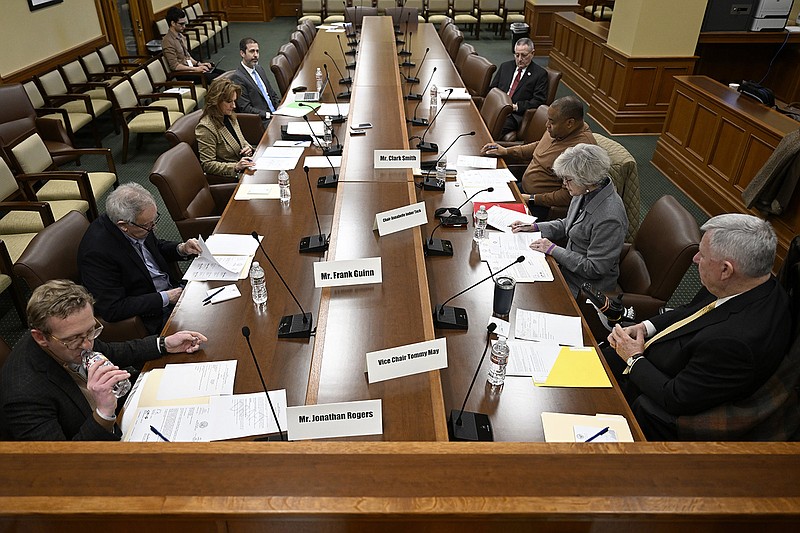The panel tasked with setting salaries for Arkansas' elected officials voted Friday to delay its consideration of pay raises for lawmakers and constitutional officers until May 12.
The Independent Citizens Commission decided to postpone the discussion after receiving letters signed by a total of 49 legislators in opposition to salary increases for members of the General Assembly. The lawmakers cited budgetary needs and the impacts of inflation on Arkansas workers and families as reasons why legislative pay increases are not currently justified.
Senate Majority Leader Blake Johnson of Corning and House Majority Leader Marcus Richmond of Harvey were among the lawmakers who signed the letters.
"Our state has many pressing budgetary needs such as increasing teacher pay, building adequate prison space to maintain public safety and enacting tax relief that rewards hardworking Arkansas taxpayers," said one of the letters signed by 41 members of the Arkansas House. "At a time when a statewide hiring freeze is in effect, raising pay for lawmakers should not register as an urgent priority."
Last month, the seven-member commission proposed a salary increase of 6% for constitutional officers and lawmakers.
Members of the panel said Friday that they could not make an informed decision on how to adjust salaries because they did not have access to information detailing what legislators are currently paid in other states.
Annabelle Imber Tuck, chair of the panel, said the regular legislative session that started last month had kept the state Bureau of Legislative Research from compiling a report for the committee on lawmaker pay outside Arkansas.
"We do not have sufficient real information to make the evidenced-based decisions we made in the past," she said.
The panel's decision to delay its consideration of the pay increases was not based on concerns about "appearances," Tuck said.
"We are looking at facts, figures, including inflation," she said. "We are not in the business of worrying about how it appears politically."
While Tuck said the letters the commission received didn't necessarily represent the sentiments of all lawmakers, she noted the panel "never had this kind of response" from legislators in the past.
By delaying the discussion on salary increases, Tuck said the committee wouldn't be freeing up more funds for the priorities legislators cited in their letters.
"The pot of money they're talking about is not the pot of money these raises come from," Tuck said. "It's apples and oranges."
During a commission meeting last month, Robert Brech, an administrator with the state Department of Finance and Administration, said an estimated $258.1 million in fiscal 2023 is expected to go to the state's central services and constitutional officers funds, which is more than enough to pay current salaries.
If the money isn't spent by the end of the fiscal year, Brech said, much of it would be swept into the central services fund, which pays the salaries of most state officials.
Members of the Arkansas General Assembly make $44,356 a year, except for the Senate president pro tempore and the House speaker, who are paid $50,661 annually, according to figures provided by the state auditor's office.
The governor's salary is $158,739. The attorney general makes $146,355 a year, and the secretary of state's annual salary is $101,322. The state treasurer, auditor and land commissioner each make $95,693 a year.
The lieutenant governor position, which is considered part-time, pays $46,704 a year, according to the state auditor's office.
The Arkansas Independent Citizens Commission was created under Constitutional Amendment 94, approved by voters in November of 2014. Along with setting salaries for constitutional officers and lawmakers, the panel is tasked with establishing pay for the state's elected officials, including judges and prosecuting attorneys.
Members of the commission are appointed by state House and Senate leaders, the governor and the state Supreme Court chief justice.
Last month, Rep. David Ray, R-Maumelle, filed legislation that would ask voters to decide if the board should be repealed. House Joint Resolution 1001 would create a ballot initiative to dissolve the commission through a constitutional amendment and return the authority to set salaries to the state House and Senate.
Shortly after filing the resolution, Ray said he felt it was a mistake to create the Independent Citizen Commission and noted Amendment 94 was written by former Republican state Sen. Jon Woods, who is serving an 18-year sentence in federal prison for corruption-related charges.
"In my opinion, Senator Woods created that Independent Citizens Commission as a mechanism to raise legislative pay without legislators having to vote on it, and it's worked out exactly as he intended it to," Ray said Jan. 23.
While Ray opposed the commission itself, he said he respected the decisions made by the individual members of the panel. He signed two of the letters addressed to the panel asking commission members to not raise salaries for legislators.
Before the panel can grant a pay raise to lawmakers and constitutional officers, it would have to vote on another proposed rate increase. Following a public comment period on the proposal, the commission would have to meet again to formally approve the raise, said TJ Fowler, legal counsel at the state auditor's office.
